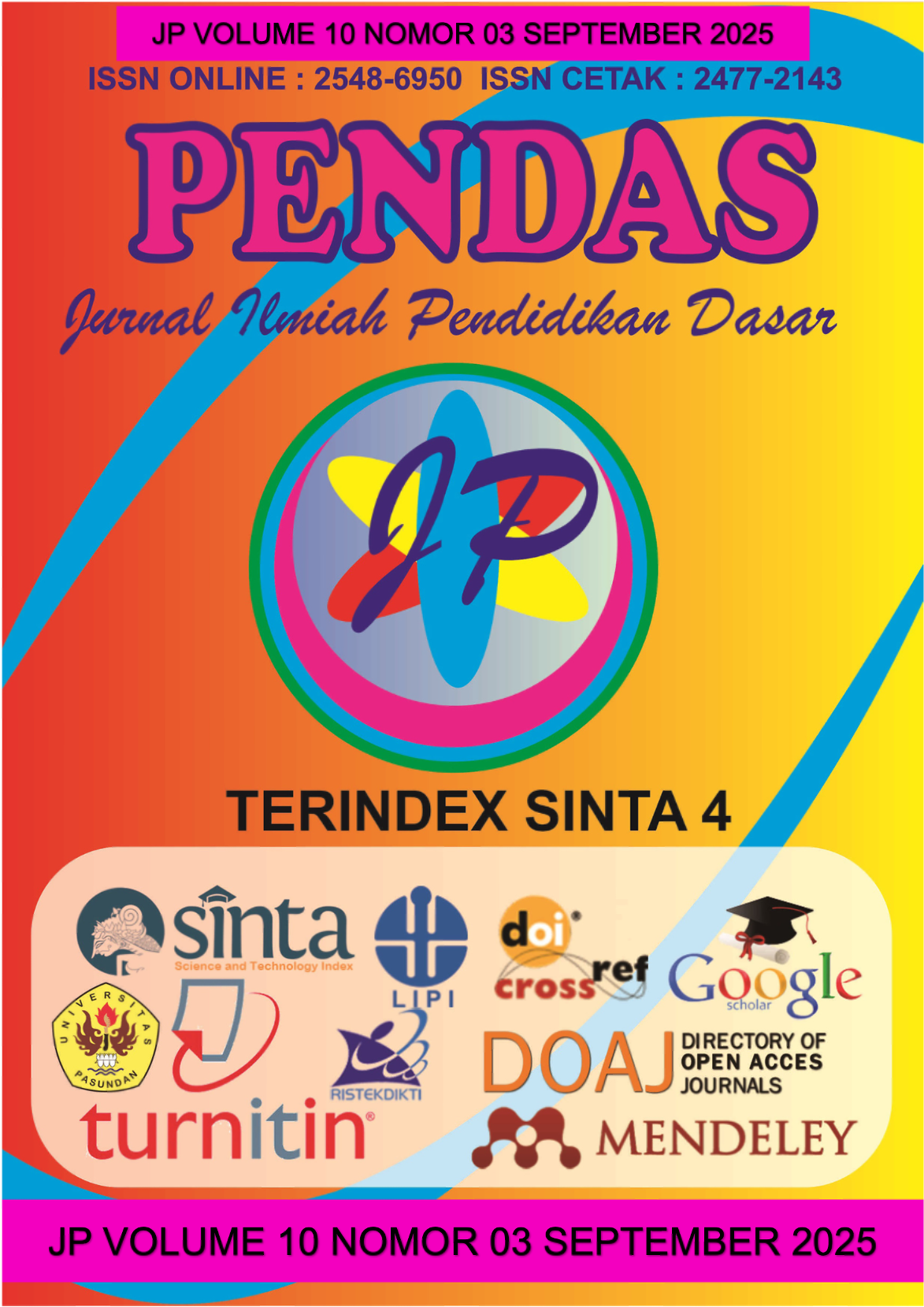PENGGUNAAN MODEL PEMBELAJARAN PROBLEM BASED LEARNING (PBL) DALAM MENINGKATKAN HASIL BELAJAR SISWA PADA MATERI FOTOSINTESIS KELAS IV SDN SIKUMANA 2
DOI:
https://doi.org/10.23969/jp.v10i03.28498Keywords:
Problem-Based Learning; Photosynthesis; Learning OutcomesAbstract
This research was conducted to answer the problem of low student learning outcomes on photosynthesis material in class IV SDN Sikumana 2. Based on the results of initial observations, it is known that the learning process is dominated by the teacher and does not involve students actively. This research is a Classroom Action Research (PTK) conducted in two cycles, with 20 students as the research subjects. Data collection techniques include observation of teacher and student activities, and learning outcomes tests. The results showed that the application of the Problem Based Learning (PBL) learning model was able to significantly improve student learning outcomes, marked by an increase in the average score from 53.32 in cycle I to 81.05 in cycle II. The level of learning completeness also increased from 35% to 85%.
From these results, it can be concluded that the Problem Based Learning (PBL) learning model is effective in improving student learning outcomes on photosynthesis material. This model encourages students to be active, think critically, and work together in groups. The findings recommend that problem-based learning be integrated in IPAS subjects in elementary schools, accompanied by periodic teacher training to support the implementation.
Keywords: Problem-Based Learning; Photosynthesis; Learning Outcomes
Downloads
References
Ariani, R. F. (2022). Pengaruh Model
Pembelajaran Problem Based
Learning terhadap Kemampuan
Berpikir Kritis Matematika Siswa
SMP.https://doi.org/10.58578/tsaqofa
h.v2i1.253
Ariyani, B., & Kristin, F. (2021). Model
Pembelajaran Problem Based
Learning untuk Meningkatkan
Hasil Belajar IPS Siswa SD.
Jurnal Imiah Pendidikan Dan
Pembelajaran, 5(3), 353.
https://doi.org/10.23887/jipp.v5i
3.36230
damayanti, R., Damayanti, R., Huda,
N., Hermina, D., Yani NoKm, J.
A., Bunga, K., Banjarmasin Tim,
K., Banjarmasin, K., & Selatan,
K. (2024). Pengolahan Hasil
Non-Test Angket, Observasi,
Wawancara Dan Dokumenter.
Student Research Journal, 3,
259–273.
https://doi.org/10.55606/srjyappi
.v2i3.1343
Fathonah, D., Untari, M. F., &
Nurhayati, S. (2023).
Penerapan Model Problem
Based Learning (PBL) untuk
Meningkatkan Hasil Belajar
IPAS pada Peserta Didik Kelas
IV SDN Rejosari 01 Semarang
Dwi. 2946–2953.
Kelana, J. B., & Wardani, D. S. (2021).
Model Pembelajaran IPA SD. In
Edutrimedia Indonesia (Issue
February).
https://www.google.co.id/books/
edition/MODEL_PEMBELAJAR
AN_IPA_SD/kxAeEAAAQBAJ?h
l=id&gbpv=1&dq=pembelajaran
ipa&pg=PP1&printsec=frontcov
er&bsq=pembelajaran ipa
Octavia, S. A. (2019). Model-model
Pembelajaran. Sustainability
(Switzerland), 11(1), 1–14.
http://scioteca.caf.com/bitstream
/handle/123456789/1091/RED2
017-Eng-
8ene.pdf?sequence=12&isAllow
ed=y%0Ahttp://dx.doi.org/10.10
16/j.regsciurbeco.2008.06.005%0Ahttps://www.researchgate.net
/publication/305320484_SISTE
M_PEMBETUNGAN_TERPUS
AT_STRATEGI_MELESTARI
Syamsidah, & Suryani, H. (2018).
Buku Model Peoblem Based
Learning (PBL). Buku, 1–92.
Utomo, P., Asvio, N., & Prayogi, F.
(2024). Metode Penelitian
Tindakan Kelas (PTK): Panduan
Praktis untuk Guru dan
Mahasiswa di Institusi
Pendidikan. Pubmedia Jurnal
Penelitian Tindakan Kelas
Indonesia, 1(4), 19.
https://doi.org/10.47134/ptk.v1i4
.821
Widyasari, D., Miyono, N., & Saputro,
S. A. (2024). Peningkatan Hasil
Belajar melalui Model
Pembelajaran Problem Based
Learning. Jurnal Inovasi,
Evaluasi Dan Pengembangan
Pembelajaran (JIEPP), 4(1),
61–67.
https://doi.org/10.54371/jiepp.v4
i1.368
Downloads
Published
Issue
Section
License
Copyright (c) 2025 Pendas : Jurnal Ilmiah Pendidikan Dasar

This work is licensed under a Creative Commons Attribution 4.0 International License.














































